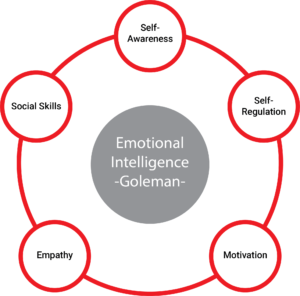We all know or have heard of managers who, while perfect on paper, are poor leaders. How is it that these qualified, competent individuals are ineffective at leading a team? The short answer is, what makes a true leader is not a stack of degrees or a glowing CV but emotional intelligence.
Emotional intelligence is more of an art than a science. There is no foolproof test for evaluating and hiring candidates based on emotional intelligence. However, a talented recruiter will be adept at identifying candidates’ emotional intelligence skills. The key is understanding what emotional intelligence involves.

Good leaders are self-aware. They know their strengths and weaknesses. They can recognize and understand their own emotions and are conscious of how their emotional states influence others and impact their performance.
Managers with good self-awareness are:
Self-regulation is an essential interpersonal skill for managers, as it helps them create a fair, healthy work environment. Managers demonstrate self-regulation when they are able to manage their emotions and impulses in any situation. This allows everyone to focus on the task at hand, without having to worry about their boss overreacting.
Emotionally intelligent leaders with good self-regulation are:
Before you can manage anyone else, you’ve got to learn to manage yourself.
– Peter Drucker, business management theorist
Leaders who demonstrate high emotional intelligence are motivated and can motivate others. Their passion for work is contagious. It is rooted in their core values and not just in social status or money. Motivated leaders put in the effort that is needed to achieve their goals and know how to rally others around them.
A boss’ motivation directly impacts his or her employees’ motivation. For leaders to rally their team around a collective goal, they must demonstrate their commitment and ability to overcome challenges.
A high emotional quotient is characterized by:
Empathy is the easiest skill to spot. Take the following scenario: On the day before a presentation to the board of directors, the chief engineer tells his boss that he will not be able to attend because his child is sick. An empathetic leader shows compassion rather than frustration, even when the stakes are high. She recognizes that everyone is human, herself included. That said, her emotional awareness should not be mistaken for complacency.
When hiring based on emotional intelligence, look for a manager who is:
This one is the culmination of all the previous interpersonal skills. When leaders have good social awareness, they can maintain healthy relationships and create solid business networks. Leaders with strong social skills believe that quality work is never achieved alone.
Managers with good social skills distinguish themselves by:
In addition to being familiar with the different emotional intelligence skills, recruiters must be capable of recognizing them in a job candidate. To this end, when they interview candidates, they must ask behavioural questions to better understand their temperament.
To get to the truth, interviewers need to know how to read between the lines and ask the right follow-up questions. After all, it is human nature to embellish during job interviews. A good interviewer, such as a headhunter, analyzes candidates’ responses to make an accurate appraisal of their interpersonal and social skills. This article from the Harvard Business Review describes, step by step, the art of conducting this type of interview so that it leads to truthful answers. Working with a reputable executive search firm such as PIXCELL is key to finding candidates with a high emotional quotient (EQ) and hiring based on emotional intelligence.
To judge a candidate’s emotional intelligence, it is also important to speak with the person’s references. Ask for specific examples where the candidate demonstrated emotional intelligence skills.
At PIXCELL, our Montreal executive search process involves a four-step evaluation of each candidate. We are meticulous in verifying their professional achievements and evaluating their conduct. Our rigorous approach gives you access to the candidates who possess the desired qualifications and who, in terms of their temperament, demonstrate the right emotional quotient for the challenges your company faces.
A good manager is not necessarily the candidate who is perfect on paper. It is the person who knows how to motivate his or her team and build relationships. It is the person who is aware of his or her strengths and weaknesses and knows how to get the most out of his or her employees. Regardless of the situation, this person looks in control. This is what is referred to as emotional intelligence. Unfortunately, it cannot be gleaned from a CV. This is what makes hiring based on emotional intelligence so challenging.
– François Piché-Roy, President and Senior Consultant, PIXCELL
According to the World Economic Forum’s Future of Jobs Report 2018, emotional intelligence will be one of the ten most in-demand skills in 2022. Some experts go so far as to say that in the business world the emotional quotient (EQ) is more important than the intelligence quotient (IQ).
The bottom line is that companies today need leaders who set themselves apart for their emotional intelligence in the workplace. Emotionally intelligent managers adapt quickly to change and drive motivation, creativity and innovation within the company. They are also better than anyone at overcoming business challenges. Recruiters therefore need to know how to hire for emotional intelligence and must focus their efforts in this direction.

Executive recruiting is undergoing a shift.

As organizations face tighter labour markets, heightened regulatory scrutiny, and rapid shifts in technology and consumer behaviour, executive hiring can no longer be treated as a one-size-fits-all process.

In a constrained leadership market, managing the executive candidate journey from first contact to final offer has become a core governance and risk issue, not simply a talent acquisition concern.